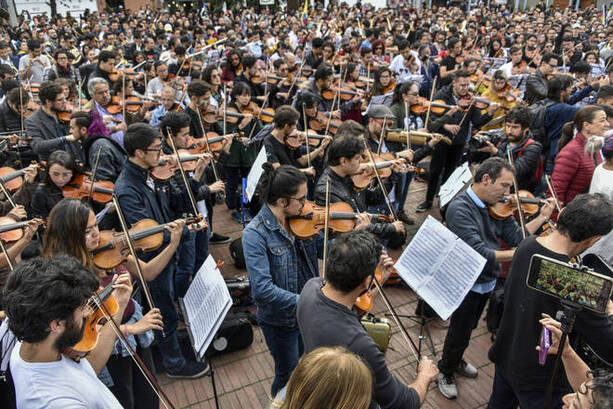 In the twenty-five years or more that I’ve been a professional music and theatre reviewer, none of my reviews have been censored. Some have been slightly edited due to space constraints, but none actually censored – until now that is! Yes, there have been many face-to-face comments from friends, acquaintances, colleagues and others, and a few private correspondents who have agreed (mainly) with my published reviews and acknowledged my insights. A few people have said they don’t agree with everything I’ve said or written about any particular performance, but only one, a certain Melissa Lo (whose pronouns and age I can only guess at – so I won’t), who, in the comments below my Theatreview review, disagreed with my appraisal of a production of the musical Wicked so vehemently that all rationality was abandoned by presuming my pronouns, skin colour and age, and ‘guessing’ (Melissa’s word) that I was “a bitter old white male who didn't understand the magical world of Oz”. Melissa went on to declare: “I wasn't at the performance and plan to see it this week,” and continued “I don’t doubt that I will be cheering for the whole cast and crew for their amazing performance”. I resisted the temptation to assure Melissa that, unlike him/her/them, I write my reviews after attending a performance, not before. And I don’t think anyone who knows me would call me “bitter”. Some of my other reviews might help to change Melissa's mind, so perhaps my review of another contemporary musical from the same directors might be a good place to start. But maybe Melissa is right about my not understanding the “magical world of Oz”, a land in which author L. Frank Baum (1856-1919), as reinterpreted in Wicked by Gregory Maguire, sees life through fairy-tale analogies and parables to assist our grasp of the mysteries of life, even if we can never fully understand them. But it seems that Melissa is much more confident of having a thorough understanding of that "magical world". Personally, I need to draw on a much wider range of experience, knowledge and associations in order to assimilate my published responses to performances. From time to time a musician or music organisation (rather than the usual print, radio or online news media) commissions me to write a review for their own promotional or online platform in the hope that it will then be more widely published, which it often is. Several years ago, the late Christopher Marshall, whose Christopher’s Classics series has reached its twenty-eighth year of providing Christchurch audiences with the very best of Aotearoa’s musical talent, asked me to review the concerts in his series, which I have been doing now since 2017. These days, most newspapers and other media in New Zealand no longer allocate budgets to pay professional reviewers, so most of those reviews have been published on Christopher’s Classics own website – an increasingly common scenario. Christopher always knew that I would maintain my honesty, integrity and unbiased views. He understood that, while some reviews would be politely positive, others might be glowing raves and a number would contain reservations. He often talked to me about what he agreed or disagreed with, but he always valued and respected my knowledge and perceptions. After all, a reviewer is just an individual with an informed opinion, and a different individual will always have their own personal response. All we can do is react to what we see and hear, to describe that response and to say why we have arrived at a particular point-of-view. As a performer myself, I have learned a great deal from others’ opinions, especially when they diverge from my own. But earlier this month, for the first time in my reviewing career, Christopher’s Classics chose not to publish my review of their latest concert featuring cellist Andrew Joyce and pianist Rae de Lisle. They paid me as usual, but I now realise that I could have earned my few dollars by being far less considered, telling the performers and promoters what they wanted to hear, and by taking less trouble than the three hours of writing, research, refining and polishing. I have no problem with them disagreeing with me – I’ve often disagreed with other reviewers’ comments myself; but to fail to publish the review without giving any reason, let alone communicating with me at all about their decision, is surely discourteous and disrespectful at best, and censorship at worst. As I said above, a review is just my own opinion. Every individual member of an audience responds differently to any given performance, and I sometimes wonder if, say, the person in front of me, applauding with vociferous enthusiasm, has genuinely found the music-making as stimulating as I have found it lacklustre, or, when I am moved to the core by a performance, whether anyone around me has shared the same, sometimes life-changing experience. A renewed era of censorship has emerged since the Russian invasion of Ukraine earlier this year. Certain Russian musicians have been censored and censured; some musicians have removed Russian works from their programmes (e.g. see my previous post regarding the Cardiff Philharmonic Orchestra) while others have added Russian pieces to their programmes, especially by composers like Shostakovich who could be said to have written the book regarding musical censorship and political oppression. In this regard, my role as a music reviewer once again came under attack when, back in March, I criticised NZ Chamber Soloists for dropping Shostakovich’s Piano Trio No. 1 from their concerts because, according to them, it “celebrates Russia as a superpower”. I was contacted by the Christchurch Press, as one of their reviewers, and my disagreement with NZ Chamber Soloists’ decision was quoted along with similar comments by others. As it happened, the group’s Christchurch concert was scheduled to be hosted by Christopher’s Classics who, in an email to their subscribers, expressed their disappointment in The Press article and named me as one of the offenders. My review of the ensemble’s concert in June was as subjective in my personal response and as objective in my analysis of the music and its performance as always, but the replacement of Shostakovich’s trio by a rather innocuous and conventional work by Armenian composer, Arno Babajanian, remains, in my view, an insidious example of the growing ‘cancel culture’ style of censorship which is becoming an increasingly worrying trend.
2 Comments
 A protest by musicians in Colombia against the government A protest by musicians in Colombia against the government In his recent (2019) book Rough Ideas, British pianist Stephen Hough ventures his opinion that “I think it is safe to say that most musicians have predominantly liberal, left-wing views . . .” and, although he claims a degree of political naivety, his book refers to a wide variety of issues that can readily be regarded as political. The fact that so many musicians of both the past and the present often take a stand against various aspects of the political status quo, certainly supports Hough’s statement. Even some of the composers who feature in parts 1 & 2 of my Politics in Music series were political and subversive activists. Richard Wagner went into exile from Germany for fifteen years following his advocacy of revolution and his participation in the failed Dresden Uprising of 1848-49. The pianist and composer Ignacy Jan Paderewski, an outspoken supporter of Polish independence, became Poland’s third Prime Minister in 1919 and was a signatory of the Treaty of Versailles. Mention of Polish independence brings another great Polish pianist to mind. In April 2009 Krystian Zimerman, who has remained one of the world’s most highly regarded pianists since winning the International Chopin Piano Competition in 1975, launched a tirade against the U.S.A's plan to establish a missile defence shield in Poland. At a Sunday night concert in Los Angeles’s Disney Concert Hall, the normally quietly-spoken Zimerman told Americans to “Get your hands off my country”. Many in the audience cheered, some shouted at him to "shut up and play the piano" and, as several people walked out yelling abuse, the pianist told them to “keep marching like the military”. He would no doubt have something to say about the U.S.’s part in supporting the election of Volodymyr Zelenskyy as president of Ukraine in order to facilitate a military presence even closer to the Russian border. That protest wasn’t the first time that Zimerman had spoken out in the U.S. against their policies. In 2006, before playing a Beethoven sonata in Baltimore, he denounced the Guantánamo Bay prison, and later the same year announced that he would not return to the U.S. until George Bush was no longer in office. Zimerman’s attitude to American military policy was probably augmented by incidents involving his personal Steinway piano, which he travelled with on major recital tours. Soon after 9/11, Customs officials at JFK Airport were suspicious about the glue in the framework of his piano, so they seized it and destroyed it! A few years later he tried bringing his new piano into the U.S.A. and Customs again confiscated it, holding it for five days and disrupting his performance schedule. Hungarian pianist András Schiff believes that “it is the responsibility of every politically informed artist to speak out against racial injustice and persecution” and argues that “artists, as sensitive individuals with a societal function, cannot be separated from political affairs.” Along with statements about politics in Austria and Hungary, Schiff’s public condemnation of Hungary’s government and its long-time Prime Minister Viktor Orbán, accusing them of racism, anti-Semitism and neo-fascism, has prevented his return to his native country since 2012. Staying with pianists, one of the world’s currently most highly regarded musicians, Igor Levit, is a familiar face on mainstream Germany TV where he participates in political panel discussions. His humanitarian views are aired on his very popular Twitter account on a daily basis, and he likes to play Beethoven’s Ode to Joy at the annual Green Party conference. Levit also played Beethoven’s Ode at the start of his recital at the opening night of the 2017 Proms in London, as a musical expression of opposition to Brexit. His humanitarian political views, and his direct involvement in politics have taken him to refugee camps and have even attracted death threats. He believes that, although “music has astonishing powers of communication, it cannot be a substitute for calling racism ‘racism’, or calling misogyny ‘misogyny’. It can never be a substitute for being a wakeful, critical, loving, living, and active citizen.” Conductor Daniel Barenboim is somewhat notorious for using the conductor’s podium as a platform for expressing his political views. Also at the 2017 London Proms, after a performance of Elgar’s Symphony No. 2, Barenboim told the audience that "Elgar was a pan-European who would not have supported Britain’s withdrawal from the European Union". He went on to lecture the audience about the dangers of Britain’s “isolationist tendencies”. Then, at the end of this year’s Vienna Philharmonic New Year Concert, in addition to the traditional wishing the audience a happy New Year, Barenboim proceeded to condemn, as so many other musicians and musical organisations have since done, the impending threat (now an all-too-real catastrophe) of a Russian invasion of Ukraine. But Daniel Barenboim’s most constant political activism is directed at Israel’s aggression towards Palestine and the Palestinians. On his website he outlines in detail his opposition to Israel's policies regarding Palestine. As a Jew and an Israeli citizen himself Barenboim is ideally placed to express such views without fear of having those views glibly dismissed as anti-Semitism. At a government ceremony in Tel Aviv, when receiving the 2004 Wolf Prize, his acceptance speech openly criticised Israel’s policies and actions concerning Palestine. As the audience applauded his comments, Israel’s Minister of Education, Limor Livnat, told them to “control yourselves” and condemned Barenboim for using the award ceremony to criticise Israel. The conductor’s efforts to unite Israeli and Arab musicians through his East-West Divan Orchestra is well-known. The Israel-Palestine situation has featured widely in protests by musicians and concert-goers around the world. In 2011 the London Philharmonic Orchestra suspended a group of its players for publicly stating their opposition to the inclusion of the Israel Philharmonic Orchestra at that year’s Proms. Their suspension sparked widespread support for their protest from musicians and artists throughout the UK. The Israel Philharmonic has also been at the centre of many other protests, one resulting in the cancellation of its visit to Sydney in 2019. Since the February 2022 Russian invasion of Ukraine, the music world has reacted emphatically with numerous demonstrations of support for Ukraine and condemnation of Russian musicians who fail to speak out about the actions of their country. In New York, the touring Vienna Philharmonic Orchestra sacked their pro-Putin Russian conductor Valery Gergiev and piano soloist Denis Matsuev, but continued to play their three concerts, including an all-Russian programme, with a different conductor and soloist. The following week, Yannick Nézet-Séguin conducted the cast, chorus, and orchestra of New York’s Metropolitan Opera in a performance of the Ukrainian National Anthem before the opening performance of its new production of Verdi’s Don Carlos, an opera whose very plot centres on the foreign invasion of an independent sovereign country. In the rush to condemn Russia, some went a bit too far. The Cardiff Philharmonic Orchestra in Wales faced a considerable public backlash when it dropped several Tchaikovsky works from a programme in March. As a consequence the orchestra announced that it would be retaining scheduled works by Shostakovich, Prokofiev and Rimsky-Korsakov later in the season. This edition of Troubleshooter includes just a very few of the many examples of politics in music, in music-making, and the music-makers themselves. It demonstrates the naivety and absurdity of any suggestion that politics has no place in music. Music, like all the arts, expresses every aspect of life, from love and betrayal to patriotism and oppression, and every human condition in between; and it will undoubtedly continue to do so as long as it has any purpose at all. |
AuthorTony Ryan has reviewed Christchurch concerts, opera and music theatre productions and many other theatre performances since the mid 1990s. ReviewsTony has presented live and written radio reviews of numerous concerts, opera and other musical events for RNZ Concert for many years. An archive of these reviews can be found at Radio New Zealand - Upbeat
His reviews of opera, music & straight theatre and numerous reviews of buskers and comedy festival performances are available at Theatreview. An archive of Tony’s chamber music reviews is held at Christopher’s Classics He has also reviewed for The Press (Christchurch). Links to Tony's Press reviews are listed below: 2024 Songs for Helen – Music by Chris Adams 2022 A Barber and Bernstein Double Bill – Toi Toi Opera The Strangest of Angels – NZOpera Will King (Baritone) and David Codd (Piano) – Christopher's Classics 2019 Ars Acustica – Free Theatre Truly Madly Baroque – Red Priest The Mousetrap – Lunchbox Theatre Iconoclasts – cLoud Last Night of the Proms – CSO 2018 An Evening with Simon O’Neill NZSO Catch Me If You Can – Blackboard Theatre Brothers in Arms – CSO Fear and Courage – CSO Sin City – CSO Don Giovanni – Narropera at Lansdowne Mad Hatter’s Tea Party – Funatorium Weave – NZTrio Tosca – NZ Opera 2017 Sister Act – Showbiz Broadway to West End – Theatre Royal Chicago – Court Theatre Tchaikovsky Symphony No. 5 – CSO Homage – CSO Last Night of the Proms – CSO SOAR – NZTrio Pianomania – NZSO Rogers & Hammerstein – Showbiz Songs for Nobodies – Ali Harper The Beauty of Baroque – CSO Travels in Italy – NZSO Archives
February 2024
Categories |

 RSS Feed
RSS Feed
